Dr. Roberto Zepeda Martínez is a young researcher and academic scholar at the Center for Research on North America (CISAN) of the National Autonomous University of Mexico (UNAM), with a background in political science and International Relations, as well as political philosophy.
One of his recent publications is the book “Subnational Dynamics in North America: Paradiplomacy of Canadian Provinces”, in which he analyzes topics such as: governance, globalization, federalism and decentralization, protodiplomacy, paradiplomacy, subnational governments in North America, regional organizations, transnational relations of Canadian provinces with the United States, national associations of subnational governments such as the National Governors Association, the Council of the Federation, and the National Conference of Governors. Similarly, the book analyzes the Canada-Mexico Seasonal Agricultural Workers Program, international economic and trade relations of Canadian provinces, and other relevant topics, which reveal the increasing relevance of Canadian provinces in the international arena.
This book is of great importance for the North American region, and in the economic, commercial, educational, cultural, political and environmental realms.
The book examines, from an interdisciplinary approach, the trajectories of diplomacy in North America, the role of the Canadian provinces from various perspectives, highlighting that subnational governments have become key players in the new international order. The factors accounting for Candian paradiplomacy are diverse. For instance, the economic globalization has eroded the role played by the nation-state, so that new players have emerged in the international system which has resulted in a new form of governance, with a multitude of actors at different scales: local, national and supranational and with different characteristics, both public and private, who share power and decision-making. In this new international order, the role of subnational governments to address global problems is crucial.
The book observes that within a complex international system that presents new models of governance, subnational governments have adopted an active position in international relations to defend their interests with respect to their economic development.
The author highlights the cases of Quebec and Catalonia as examples of subnational governments in their intention to promote international cooperation in crucial areas such as: education, training, science and technology, as well as the preservation of culture and identity.
The author of the book carries out very interesting methodological research in which he reviews bibliographic and documentary research sources, including historical archives, libraries, documentation centers and information centers, to enrich this fundamental and transcendent work.
This book presents, in short, a new perspective on international relations, highlighting the role of subnational governments.
Víctor Hugo Guzmán Horta
Political Philosopher








